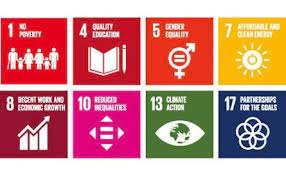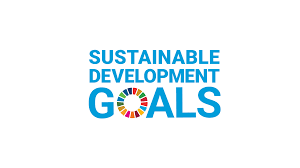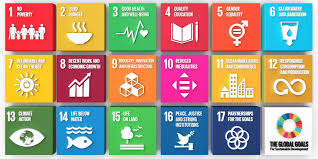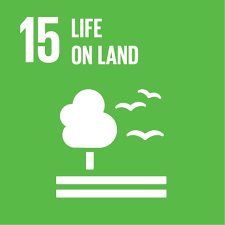The Sustainable Development Goals for 2030: A Global Call to Action
In 2015, world leaders came together at the United Nations to adopt the 2030 Agenda for Sustainable Development, a set of 17 ambitious goals aimed at addressing pressing global challenges and creating a more sustainable future for all. These goals, known as the Sustainable Development Goals (SDGs), cover a wide range of issues, including poverty, inequality, climate change, environmental degradation, peace, and justice.
As we approach the year 2030, the deadline for achieving these goals is fast approaching. While progress has been made in some areas, there is still much work to be done to ensure that we meet the targets set out in the SDGs. From ending poverty and hunger to promoting gender equality and protecting the planet, each goal represents a critical aspect of building a better world for current and future generations.
The Importance of the SDGs
The SDGs provide a roadmap for countries and organizations to work together towards common objectives that benefit people and the planet. By focusing on interconnected issues such as education, health, clean energy, sustainable cities, and responsible consumption and production, the SDGs recognize that achieving sustainable development requires a holistic approach that addresses social, economic, and environmental challenges simultaneously.
Challenges Ahead
Despite progress in some areas, many challenges remain in achieving the SDGs by 2030. Issues such as climate change, biodiversity loss, rising inequality, conflicts and humanitarian crises continue to threaten our ability to create a more sustainable world. It is crucial that governments, businesses, civil society organizations, and individuals redouble their efforts to accelerate progress towards the SDGs.
Call to Action
As we look towards 2030 and beyond, it is imperative that we all play our part in advancing the Sustainable Development Goals. Whether through advocacy efforts, policy changes, sustainable business practices or individual actions in our daily lives, each of us has a role to play in contributing to a more just and sustainable world.
By working together towards common objectives outlined in the SDGs, we can create a future where no one is left behind and where prosperity is shared equitably among all people. Let us seize this opportunity to build a better world for ourselves and future generations by embracing the vision of sustainable development encapsulated in the 2030 Agenda.
7 Key Benefits of the 2030 Sustainable Development Goals: Building a Just and Equitable Future
- 1. Address pressing global challenges such as poverty, inequality, and climate change.
- 2. Provide a roadmap for countries to collaborate on common objectives for sustainable development.
- 3. Promote gender equality and empower women and girls worldwide.
- 4. Encourage responsible consumption and production practices to reduce waste and environmental impact.
- 5. Foster partnerships between governments, businesses, and civil society to achieve shared goals.
- 6. Focus on education, health, clean energy, sustainable cities, and other key areas for holistic development.
- 7. Aim to create a more just and equitable world where prosperity is shared among all people.
Challenges Facing the 2030 Sustainable Development Goals: Unrealistic Timelines, Lack of Accountability, and Resource Constraints
1. Address pressing global challenges such as poverty, inequality, and climate change.
Sustainable Development Goals 2030 offer a crucial opportunity to address pressing global challenges such as poverty, inequality, and climate change. By setting specific targets and outlining strategies for tackling these complex issues, the SDGs provide a framework for coordinated action on a global scale. Through initiatives aimed at eradicating poverty, promoting social equity, and mitigating the impacts of climate change, the SDGs pave the way for a more sustainable and inclusive future for all. By prioritizing these interconnected challenges, the SDGs demonstrate a commitment to building a more resilient and equitable world for current and future generations.
2. Provide a roadmap for countries to collaborate on common objectives for sustainable development.
The Sustainable Development Goals for 2030 serve as a crucial tool in fostering global collaboration among countries by providing a roadmap for working together towards common objectives for sustainable development. By outlining a set of shared goals and targets, the SDGs facilitate coordination and cooperation among nations to address pressing global challenges such as poverty, inequality, climate change, and environmental degradation. This collaborative approach not only promotes knowledge sharing and best practices but also encourages mutual support and solidarity in achieving sustainable development outcomes that benefit all nations and contribute to a more equitable and prosperous world for present and future generations.
3. Promote gender equality and empower women and girls worldwide.
Promoting gender equality and empowering women and girls worldwide, as outlined in the Sustainable Development Goals for 2030, is a crucial pro that has far-reaching benefits. By ensuring equal rights and opportunities for women and girls, societies can unlock their full potential, leading to greater economic growth, improved health outcomes, and enhanced social cohesion. Empowering women and girls not only fosters individual empowerment but also contributes to building more inclusive and resilient communities. Through targeted efforts to promote gender equality, the Sustainable Development Goals offer a pathway towards a more equitable and sustainable future for all.
4. Encourage responsible consumption and production practices to reduce waste and environmental impact.
Encouraging responsible consumption and production practices as outlined in Sustainable Development Goal 4 for 2030 offers a multitude of benefits. By promoting sustainable resource management and waste reduction, we can minimize environmental impact, conserve natural resources, and mitigate climate change. Embracing practices that prioritize efficiency and sustainability not only helps protect the planet for future generations but also fosters a more resilient and equitable global economy. Through conscious consumption choices and innovative production methods, we can create a more sustainable world where waste is minimized, resources are utilized efficiently, and environmental degradation is significantly reduced.
5. Foster partnerships between governments, businesses, and civil society to achieve shared goals.
One key advantage of the Sustainable Development Goal 2030 agenda is its emphasis on fostering partnerships between governments, businesses, and civil society to achieve shared goals. By collaborating across sectors, stakeholders can leverage their unique strengths and resources to address complex challenges more effectively. This approach promotes innovation, knowledge-sharing, and collective action, ultimately driving sustainable development forward in a coordinated and inclusive manner. Through strategic partnerships, diverse perspectives can be harnessed to develop holistic solutions that benefit society as a whole, paving the way for a more resilient and prosperous future for all.
6. Focus on education, health, clean energy, sustainable cities, and other key areas for holistic development.
The focus on education, health, clean energy, sustainable cities, and other key areas within the Sustainable Development Goals for 2030 represents a holistic approach to development that recognizes the interconnectedness of social, economic, and environmental factors. By addressing these fundamental aspects of human well-being and sustainable growth, the SDGs aim to create a more inclusive and resilient society. Investing in education and healthcare can empower individuals and communities, while promoting clean energy and sustainable urban planning can mitigate climate change and improve quality of life for all. This integrated approach ensures that progress in one area reinforces advancements in others, leading to a more balanced and sustainable future for generations to come.
7. Aim to create a more just and equitable world where prosperity is shared among all people.
The Sustainable Development Goal 2030 that aims to create a more just and equitable world where prosperity is shared among all people is a crucial step towards building a more inclusive and sustainable global society. By prioritizing the goal of ensuring that economic opportunities, resources, and benefits are distributed fairly among all individuals, regardless of their background or circumstances, the SDGs promote social justice and equality. This pro highlights the importance of addressing systemic inequalities and working towards a future where everyone has the opportunity to thrive and contribute to a more prosperous world for generations to come.
1. Unrealistic Timelines
One of the main criticisms of the Sustainable Development Goals for 2030 is the issue of unrealistic timelines. Critics contend that the deadline set for achieving these goals by 2030 may be overly ambitious, particularly considering the intricate and interrelated nature of the challenges they seek to tackle. The complexity of issues such as poverty, climate change, inequality, and sustainable development requires comprehensive and sustained efforts that may extend beyond the designated timeframe. Addressing these systemic challenges effectively will necessitate a long-term commitment and continuous collaboration among stakeholders to ensure meaningful progress towards a more sustainable future.
2. Lack of Accountability
Ensuring accountability and monitoring progress towards the Sustainable Development Goals for 2030 can be hindered by a significant con: the lack of a formal enforcement mechanism for countries or organizations to uphold their commitments. Without robust accountability measures in place, there is a risk that some entities may not prioritize or fully implement the necessary actions to achieve the SDGs. This lack of accountability could lead to delays, inconsistencies, or even neglect in addressing critical global challenges outlined in the goals, ultimately hindering the overall success of the 2030 Agenda for Sustainable Development.
3. Resource Constraints
Addressing the con of resource constraints in implementing the Sustainable Development Goals for 2030 is crucial. The ambitious nature of the SDGs necessitates substantial financial investments, technology transfers, and capacity-building initiatives, presenting a significant challenge for developing nations that have limited resources at their disposal. Without adequate support and assistance in overcoming these resource constraints, the ability of these countries to effectively implement and achieve the SDGs may be hindered, risking leaving behind those most in need of sustainable development interventions. Efforts to address this con must focus on fostering partnerships, promoting innovative financing mechanisms, and facilitating knowledge sharing to ensure that all countries can participate meaningfully in the global pursuit of sustainable development.





